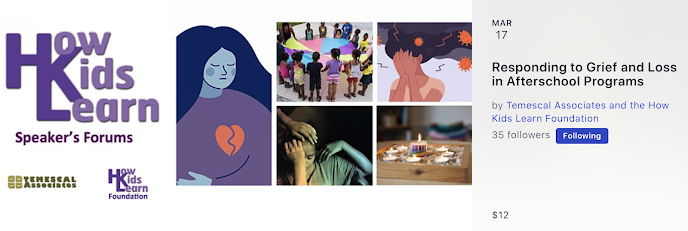 |
| Source: www.ctff.us |
By Sam Piha
We interviewed Malia Villarreal (Public & Strategic Development Manager) and Mike Snell (CEO) at California Teaching Fellows Foundation (CTFF) which views afterschool programs as a valuable experience for future teachers. Below are their responses.
You can view our paper on Afterschool as a Teacher Pathway here. We also conducted a webinar on this topic, which you can view here.
Q: Can you describe how the California Teaching Fellows Foundation (CTFF) works?
A: CTFF at Fresno State University (FSU) links college students with opportunities for paid placements working in afterschool, summer, and regular school day programs in public schools, charter schools, and community centers. These college students gain experience working with school site leaders, students, and families so they know the climate and culture of the school well before becoming a teacher. They’re diverse and have built relationships so they’re well prepared and reflect the community they serve. We also provide ongoing monthly paid professional development via our Teaching Fellow Academies; where tutors gain access to incredible out-of-school time professionals as well as K-12 and Higher Education leaders who help professionally develop them.
The Teaching Fellow Academies have intentionally provided additional content and training around social and emotional learning supports, trauma-informed practices, and social and cultural pedagogy. In addition to the Teaching Fellows Academies, CTFF offers the DREAM Initiative which provides personal development to Teaching Fellows. Examples of DREAM services are one on one life coaching, CBEST prep workshops, group meet-ups, home buying workshops, financial literacy, a care fund, and so many other great benefits that help Teaching Fellows reach their full potential.
Q: Can you give an example of how CTFF works from the perspective of a teaching fellow?
 |
| Erika Martinez |
Erika started as a Teaching Fellow tutor working in an afterschool program in 2014. After over two years as a tutor managing a classroom of 20 students, then Erika was promoted to a Site Coordinator where she served for two more years. As a Site Coordinator, Erika managed the school’s afterschool program and a team of 12 tutors and one ASL. Her school site regularly served 220 students a day. In 2020, Erika earned a bachelor's degree in Liberal Studies. While Erika’s story is amazing, she is not unlike many amazing Teaching Fellows who take advantage of CTFF’s model.
Q: Can you explain how the experience of afterschool workers are relevant to becoming a teacher. What advantages do these experiences offer?
A: As Erika leaves the CTFF, she takes with her nearly 3,000 hours of hands-on classroom experience, more than 120 hours of professional and personal development via the Teaching Fellows Academies (paid professional development), and a deep understanding of school systems and the communities they serve. Erika represents the demographics we see throughout the Teaching Fellows program: diverse, educated, first-generation, bi-lingual college students, and highly motivated to make a difference in her community. As she graduates from her Teacher Residency program, Erika will be day 1 ready to teach. Erika, like so many Teaching Fellows, has tremendous capital; she is culturally competent, linguistically diverse, aspires for a better future, and is acutely aware of what it takes to work with school-age youth, families, and educational professionals. Erika’s experiences’ like so many others who work in afterschool programs, perfectly prepare her to take advantage of career path opportunities in education and position them well to navigate it.
While teachers have the California Standards for the Teaching Profession (CSTP), fortunately, afterschool (also referred to as expanded learning professionals) have the Learning In Afterschool & Summer’s Principles (LIAS) and California Quality Standards for Expanded Learning Programs. The LIAS and quality standards are the framework we provided to Teaching Fellows who are serving as educators and leaders for students. There are natural similarities between the standards in afterschool and the standards of the teaching profession. While more research needs to be done to connect the afterschool quality standards to the teaching profession standards, it is clear that the pre-service experiences in afterschool programs help leaders like Erika in their pursuits of becoming a teacher.
END OF PART 1
Temescal Associates and The How Kids Learn Foundation will be conducting a webinar featuring a presentation by Brittany Collins and a panel of experts on Responding to Grief and Loss in Afterschool Programs, Thursday, March 17, 2022 from 10:00am - 12:00pm (PST). To learn more and register, click HERE.








No comments:
Post a Comment